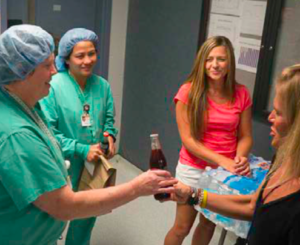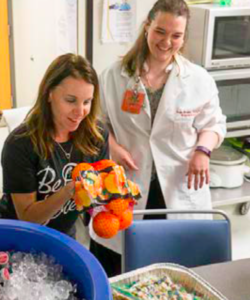Currently, 13 congregations representing many denominations have adopted clinical units.
By Les Gura
Taryn Jaster (left, in white coat) has been a paramedic and operating room nurse and now is a nurse in the Emergency Department at Wake Forest Baptist Medical Center. As much as anyone, she understands the stress faced by caregivers.
As she pursued her master’s degree, caregiver stress became the focus of her major research project. Her studies led her to Rev. Maria Teresa Jones, Wake Forest Baptist’s chaplain for staff support.
Jones told her about the FaithHealth Unit Adoption Program, in which outside congregations “adopt’’ a clinical care unit. The goal is to provide support to Medical Center employees who care for patients and families to help them feel more appreciated.
Reducing compassion fatigue
“It’s very important to refuel yourself,’’ Jaster says. “We constantly give to people, give of ourselves, give of our time. But when people in our profession are at work, those we help are not always in a position to be appreciative of what we do. And a lot of times they can’t come back later and say ‘thank you.’
“Having the community come in and say ‘We appreciate what you do’ is so important.”
 Jaster, a member of The Summit Church in Kernersville, brought the idea to her church’s community outreach team in February. Each month since, The Summit Church has brought breakfast or afternoon snacks to the Operating Room team — as many as 140 providers. From coffee, biscuits and fruit to a popcorn machine in the afternoon, the OR team gets a pick-me-up that recognizes the importance of the work they do on a daily basis.
Jaster, a member of The Summit Church in Kernersville, brought the idea to her church’s community outreach team in February. Each month since, The Summit Church has brought breakfast or afternoon snacks to the Operating Room team — as many as 140 providers. From coffee, biscuits and fruit to a popcorn machine in the afternoon, the OR team gets a pick-me-up that recognizes the importance of the work they do on a daily basis.
All congregation visits are coordinated by Jones.
“Unit adoptions make the staff feel cared for; that they are not taken for granted and that they matter,’’ Jones says. “This boosts morale in ways that make them want to come to work. Giving care in reciprocity reduces compassion fatigue.’’
This is what we need
Currently, 13 congregations representing many denominations have adopted clinical units. Each unit has different needs, Jones says. For example, the Neonatal Intensive Care Unit is cared for by Reynolda Presbyterian Church, which brings food and snacks for the staff and blankets for babies. The Trauma Units have been adopted by the Ministers Conference of Greater Winston-Salem, a group representing multiple congregations. When the Ministers Conference members deliver coffee, food and snacks to the Trauma Units, they also collect confidential prayer requests from the Medical Center staff.
Congregations can provide “whatever the staff needs to make the days go by easier and lighter,’’ Jones says.
As someone who is both a provider and a liaison for her church, Jaster sees the benefits from both viewpoints.
“What sparked my master’s project on compassion and fatigue was seeing how people get more irritable if they’re tired. We have 12-hour days and by the end of the day we are stressed out,’’ she said. “Turnover is a huge problem, especially for the OR.
“After a visit by a congregation takes place, for the next week at least, people will catch me in the hallway and say ‘thanks for coordinating this.’ I think it’s had a very positive influence.”
Count Phyllis Love, RN, BSN, among the believers. Love is one of several OR clinical coordinators.
“It’s really great having an outside agency that can sponsor you. The nurses feel like they’re loved on,’’ she says. “Taryn was on my team and when she presented this program, I said, ‘This is great. This is what we need.’ It’s a great partnership.”
Congregations interested in learning more about the Unit Adoption Program may email Rev. Maria Teresa Jones.
Related post: ED Staff Memorializes Homeless Friend

